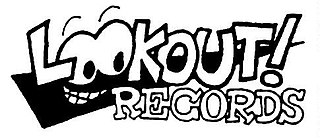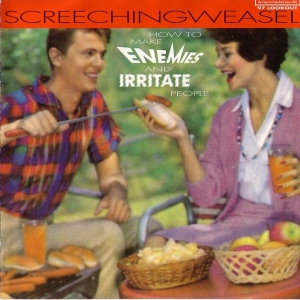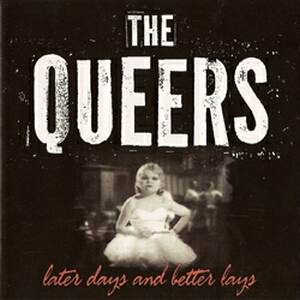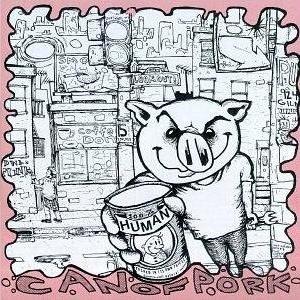
Lookout Records was an independent record label, initially based in Laytonville, California, and later in Berkeley, focusing on punk rock. Established in 1987, the label is best known for having released Operation Ivy’s only album, Energy, and Green Day's first two albums, 39/Smooth and Kerplunk.

39/Smooth is the debut studio album by American rock band Green Day, released on April 13, 1990, by Lookout Records. It was the band's only album to feature drummer John Kiffmeyer. Jesse Michaels of Operation Ivy contributed the artwork on the album. The inner sleeve shows handwritten lyrics by Billie Joe Armstrong and letters by drummer John Kiffmeyer and Lookout owner Larry Livermore to I.R.S. Records, rejecting a fake offer to sign to the label and declaring its loyalty to Lookout. There were no official singles released from the album, although "Going to Pasalacqua" was released as a mock-up single in a Green Day singles box set entitled Green Day: Ultimate Collectors.

The Queers are an American punk rock band, formed in 1981 by Portsmouth, New Hampshire native Joseph “Joe” P. King along with Scott Gildersleeve, and John “Jack” Hayes. With the addition of Keith Hages joining on bass in 1983 the band started playing their first public performances. This original lineup played a total of five or six live shows. The original lineup of The Queers initially broke up in late 1984, but reformed with Joe Queer and a new line-up in 1986. In 1990, the band signed with Shakin' Street Records and released their first album Grow Up. The album earned the band notability within New England, but with the release of their next album 1993's Love Songs for the Retarded, on Lookout! Records, their following grew larger.
The Lillingtons were a pop-punk band formed in 1995 in Newcastle, Wyoming. The band is composed of its original members, vocalist and lead guitarist Kody Templeman, drummer Tim O’Hara, bassist Cory Laurence, and later added rhythm guitarist Alex Volonino.
The Lookouts were an American punk rock band that existed from 1985 to 1990 on Iron Peak, a remote rural mountain community outside Laytonville, California, United States. The members were Larry Livermore on guitar and vocals, Kain Kong on bass and vocals, and Tré Cool on drums and vocals. All three contributed on songwriting.

Boogadaboogadaboogada! is the second studio album by the Chicago-based punk rock band Screeching Weasel. The album was originally released on vinyl in December 1988 through Roadkill Records. It was the group's only album to feature Fish on bass and the last with Steve Cheese on drums, both leaving the band shortly after the album's release. Although still influenced by hardcore punk, the album also shows hints of the band's later Ramones-inspired sound.

My Brain Hurts is the third studio album by the Chicago-based punk rock band Screeching Weasel. The album was originally released on CD, vinyl and cassette in September 1991 through Lookout Records. It was the group's first album on Lookout as well as the only release with bassist Dave Naked and the first with drummer Dan Panic, the latter of which would go on to appear on several of the band's albums. The album marked a very distinct stylistic shift for the group, fully moving toward a Ramones-inspired sound and completely abandoning their previous hardcore punk influences as a condition made by vocalist Ben Weasel when reforming the band after a brief break-up.

Wiggle is the fifth studio album by the Chicago-based punk rock band Screeching Weasel. Initially planned for release in November 1992, the album was finally released on CD, vinyl and cassette on January 15, 1993, through Lookout Records. Due to a "cymbal hissing" in the original vinyl version, the album was remixed and re-released soon afterwards.

How to Make Enemies and Irritate People is the seventh studio album by the Chicago-based punk rock band Screeching Weasel. Planned as the group's final album, it was released in August 1994 on CD, vinyl, and cassette through Lookout Records. Shortly before recording the album, bassist/backing vocalist Dan Vapid left the band and, as a result, Green Day bassist Mike Dirnt was recruited to play on the album.

Love Songs for the Retarded is the second studio album by the American punk rock band the Queers, released in 1993 by Lookout! Records. It was the first of five studio albums the band would record for Lookout!, and their first by the lineup of singer and guitarist "Joe Queer" King, bassist Chris "B-Face" Barnard, and drummer Hugh O'Neill. It was also their first collaboration with Screeching Weasel frontman Ben Weasel, who produced the album and co-wrote two of its songs, and the first of three Queers albums recorded at Sonic Iguana Studio in Lafayette, Indiana with audio engineer Mass Giorgini, who would continue to work with the band on and off for the next 14 years as a producer and engineer. Love Songs for the Retarded became the Queers' highest-selling album, with sales surpassing 100,000 copies.

Grow Up is the debut album by the American punk rock band the Queers. Recorded in multiple sessions between 1986 and 1988, with various band members and session musicians backing singer and guitarist Joe King, it was originally released as an LP record in 1990 by British label Shakin' Street Records. However, the label went out of business after only 1,000 copies were pressed. The Queers had more copies pressed themselves, continuing to list Shakin' Street as the record label, but when they failed to pay their bill the pressing plant destroyed all but approximately 160 copies, which the band released with a photocopied album cover.

Beat Off is the fourth studio album by the American punk rock band the Queers, released in 1994 by Lookout! Records. Recorded during a time when the Queers' usual drummer, Hugh O'Neill, was on a forced leave of absence from the band to deal with heroin addiction, it featured Screeching Weasel drummer Dan Panic and guitarist Dan Vapid added to the lineup. It was the third and final Queers album produced by Screeching Weasel singer Ben Weasel, who insisted on a no-frills punk sound for the album and removed Vapid's tracks from the final mix without his knowledge.

A Day Late and a Dollar Short is a compilation album by the American punk rock band the Queers, released in January 1996 by Lookout! Records. It collects material recorded between 1982 and 1994, most of it with original member Wimpy Rutherford. It includes the band's first two EPs, 1982's Love Me and 1984's Kicked Out of the Webelos, several demo tracks recorded in 1991, 16 tracks recorded during a January 1993 reunion with Rutherford, and a complete set of early songs recorded live on radio station WFMU in 1994 with Rutherford on lead vocals.

Surf Goddess is an EP by the American punk rock band the Queers, released in February 1995 by Lookout! Records. It marked the return of longtime drummer Hugh O'Neill to the band, after a forced leave of absence to deal with heroin addiction. Former Screeching Weasel member Dan Vapid, who had been a member of the Queers in 1994, played on the EP as a guest guitarist. Surf Goddess was the result of band leader Joe King and Lookout! head Larry Livermore being dissatisfied with the production techniques on the band's prior album, 1994's Beat Off, which producer Ben Weasel had insisted on keeping basic. King and Livermore wanted to incorporate overdubbing and other effects which Livermore felt were essential to the Queers' sound. In addition to the title track, which was co-written by Weasel, and the Queers original "Quit Talkin'", the EP includes cover versions of Tommy James and the Shondells's "Mirage" and the Undertones' "Get Over You".

Don't Back Down is the sixth studio album by the American punk rock band the Queers, released in August 1996 by Lookout! Records. The band and Lookout! president Larry Livermore, who served as executive producer, sought to balance the sounds of the Ramones and the Beach Boys, and enlisted the help of former Queers guitarist JJ Rassler and Cub singer Lisa Marr. The album's title track is a cover version of the Beach Boys song of the same name; it also features covers of the Hondells' "Little Sidewalk Surfer Girl" and Hawaiian punk band the Catalogs' "Another Girl". The album produced the band's first music videos, for "Punk Rock Girls" and "Don't Back Down".

Punk Rock Confidential is the sixth full-length album by pop punk band The Queers and their first album released on Hopeless Records.

Later Days and Better Lays is a compilation album by the American punk rock band the Queers, released in March 1999 by Lookout! Records. It combines a 14-song demo tape from 1991 with some demos recorded in the lead-up to their 1996 album Don't Back Down, as well as some outtakes from that album's recording sessions. The compilation fulfilled the band's contractual obligations to Lookout!, following seven years and four studio albums on the label. They moved on to Hopeless Records, but would return to Lookout! for the Today EP (2001) and album Pleasant Screams (2002) before parting ways with the label again.

Can of Pork is a compilation album of various punk rock artists. It was released as two 12-inch vinyl records or one CD in April 1992 by Lookout Records. The vinyl version has a booklet of lyrics and photography and the CD version has information on contacting the bands and a detailed description of the compilation's production.

The discography of the Queers, an American punk rock band, consists of 13 studio albums, 9 live albums, 4 compilation albums, 1 video album, 3 music videos, 22 EPs, 1 single, and 1 split album.
Between 1993 and 2000, a series of Ramones covers albums were released by Selfless Records, an independent record label based in Garland, Texas specializing in punk rock, on which bands influenced by seminal punk group the Ramones performed cover versions of entire Ramones albums. Under the Selfless label, Screeching Weasel, the Queers, and the Vindictives respectively covered the first three Ramones albums: Ramones (1976), Rocket to Russia (1977), and Leave Home (1977). Selfless then became Clearview Records and continued the series, with Boris the Sprinkler, the Parasites, the Mr. T Experience, the Beatnik Termites, and the McRackins respectively covering End of the Century (1980), It's Alive (1979), Road to Ruin (1978), Pleasant Dreams (1981), and Too Tough to Die (1984).


















